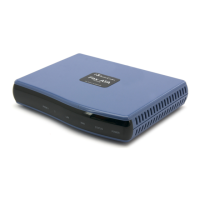User's Manual 16. Advanced Networking Features
Version 4.4.3 265 MP-20x Multimedia Home Gateway
16 Advanced Networking Features
This chapter describes various advanced networking features such as DHCP.
16.1 IP Address Distribution
The device's Dynamic Host Configuration Protocol (DHCP) server makes it possible to
easily add computers that are configured as DHCP clients to the home network. It provides
a mechanism for allocating IP addresses and delivering network configuration parameters
to such hosts. The device's default DHCP server is the LAN bridge.
A client (host) sends out a broadcast message on the LAN requesting an IP address for
itself. The DHCP server then checks its list of available addresses and leases a local IP
address to the host for a specific period of time and simultaneously designates this IP
address as `taken'. At this point, the host is configured with an IP address for the duration
of the lease.
The host can choose to renew an expiring lease or let it expire. If it chooses to renew a
lease then it also receives current information about network services, as it did with the
original lease, allowing it to update its network configurations to reject any changes that
may have occurred since it first connected to the network. If the host wishes to terminate a
lease before its expiration it can send a release message to the DHCP server, which then
makes the IP address available for use by others.
The device embedded DHCP server provides the following features:
Displays a list of all DHCP host devices connected to the device
Defines the range of IP addresses that can be allocated to the LAN
Defines the length of time for which dynamic IP addresses are allocated
Provides the above configurations for each LAN device and can be configured and
enabled / disabled separately for each LAN device
Can assign a static lease to a LAN PC so that it receives the same IP address each
time it connects to the network even if this IP address is within the range of addresses
that the DHCP server may assign to other computers
Provides the DNS server with the host name and IP address of each PC that is
connected to the LAN
In addition, the device can act as a DHCP relay, escalating DHCP responsibilities to a
WAN DHCP server. In this case, the device acts merely as a router, while its LAN hosts
receives their IP addresses from an external DHCP server on the WAN.
With the device's optional Zero Configuration Technology feature, the IP Auto Detection
method detects statically-defined IP addresses in addition to the device's DHCP clients. It
learns all the IP addresses on the LAN and integrates the collected information with the
database of the DHCP server. This allows the DHCP server to issue valid leases, thus
avoiding conflicting IP addresses used by other computers in the network.

